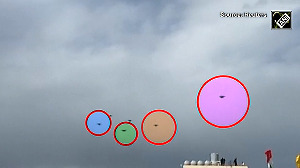The Western world keeps talking, ratcheting up sanctions, the only thing it can do.
The Russians march on to Kyiv and capture Zelensky and key members of his government as part of their de-Nazification' drive, predicts Shreekant Sambrani.

Pity Mr Volodymyr Zelensky. The hapless Ukrainian president, very likely the last democratically elected one to that office, for a long, long time, must be the last person to realise that no one was coming to the rescue of his beleaguered nation in the face of a ruthlessly executed, swift Russian invasion.
He must have believed that after the blitz of all those visits by all those high-ranking European and American personages throughout the last month or so would surely result more than mere optics, or racking up of frequent flyer miles.
Were the Americans not saying that the Russian invasion was imminent, any day now? That wouldn't simply be crying wolf, would it?
When it did dawn on him finally that he was fighting the big bad wolf when it did attack him, he was all alone, he used a sombre tone to address his country on the morning of February 25.
He had also shed his customary white shirt and jacket in favour of an attire more in line with the leader of country hunkering down for a siege.
When some of his fellow citizens taking shelter in a Kharkiev metro station asked an international television interviewer, 'Why isn't anyone coming to help us?', they didn't really expect an answer, because they knew nobody was coming.
Yes, Mr Joe Biden, Mr Boris Johnson and the NATO dignitaries thundered down with equally swift economic sanctions, quickly followed by their Australian and Japanese counterparts.
What would be their immediate impact?
One wise-guy commentator on television said, 'Oh, gee, too bad, Putin won't be able to do his Christmas shopping at Macy's!'
He was indulging in hyperbole, of course, but there was a kernel of truth in what he said.
The sanctions would be effective, even if partly, only in the medium term.
For now, Putin's Russia has built up enough supplies to overcome any immediate impact of the sanctions.
The rouble crashed, so did Russian stocks, but how does that affect the price of vodka and borscht in Moscow?
Oil has shot up to over $105 a barrel and no one in the world has uttered a word about not buying Russian oil.
They know that doing so would be suicidal for the world ever thirsty for oil.
If it refused to buy Russian oil, supplies from the OPEC countries would touch $150 a barrel or more!
So a direct consequence of the sanctions is to increase Russian oil revenues.
Germany has given in to American pressure and announced the temporary shelving of the Nord Strom II pipeline.
But Germany, as also the rest of Europe, needs Russian natural gas now more than ever before.
The American talk of arranging alternative supplies from Qatar is just: Mere gas!
The costs and logistics are unimaginable.
Germany has already announced shutting down its nuclear power plants in the next 10 years and will thus desperately need gas as alternative source of energy.
It cannot possibly go back on the nuclear power plant decision, because the Greens are now a part of the ruling coalition.
Within the United States, rising oil prices translate directly into higher cost of the fuel at the pump and higher home heating costs.
When the euphoria of 'teaching a lesson to Putin' wears off, these issues will become critical at the ballot box.
With the United States Congress so delicately balanced between the Democrats and Republicans and President Biden's popularity ratings none too high, would he want to give the Republicans (read Donald Trump in waiting) a readymade election issue?
Your guess is as good as mine!
And sanctions on the oligarchs mean even less. It is widely believed that these 50 or so individuals are the dummy holders of Putin's fortune, estimated to be above $200 billion.
He has voted himself in power for at least a decade-and-a-half more.
That ought to be sufficient time to create another set of oligarchs and another fortune of like size.
Notice that all those leaders of democracies are talking only of sanctions, while Putin's Russia marches in troops and rains rockets and missiles on key centres of Ukrainian population.
Every commentator has compared this action as the worst since World War II.
So why is the Western world not resorting to what won it that war: Boots on the ground with convoys of tanks and retaking positions with enough staying power?
That is simply out of the question seventy-five years later.
Russia has over 100,000 troops surrounding Ukraine on three sides.
To effectively combat them, tens of thousands of troops and thousands of armoured vehicles, with enough ammunition to last a prolonged ground war would be needed.
Russia is also well-equipped with air power, with modern missiles.
That too, would have to be countered.
No matter how NATO powers talk of rushing arms and supplies to countries near Ukraine, the amounts involved are but a fraction of what the Russians have already assembled and are using.
Ground war does not appeal to the Western allies at all, after three decades of unending combat in the Middle East and Afghanistan.
Their legislatures look askance at approving billions in expenditure and the leaders and the voting public alike do not want to see any more young men and women coming home in body bags.
One possible way for the Western powers is to threaten saturation bombing of the Kremlin, much like what happened in WWII.
This too is a non-starter. Putin has already threatened consequences never thought of before if outsiders intervene.
Coming from the head of a country with the second largest nuclear arsenal, that can never be taken as an idle threat.
Reports from Ukraine today say that the Russians aim to capture Chernobyl. So that intent is absolutely clear.
The sly fox that Putin is, all these must have entered his decision-making matrix. And his timing couldn't be better.
The world is just waking up to the disaster that Afghanistan is after the withdrawal (collapse, really) of Americans and their allies.
It would have no stomach whatsoever now for another protracted ground conflict, even if it is in Europe.
So what happens now? The Western world keeps talking, ratcheting up sanctions, the only thing it can do.
The Russians march on to Kyiv and capture Zelensky and key members of his government as part of their 'de-Nazification' drive.
At best, the friendly powers rescue them and spirit them away to set up a government in exile.
The Russians establish a puppet regime and 'withdraw' with a great deal of fanfare, patting themselves on the back that they always had limited objectives and having achieved them, are back in their country, much like the Chinese did with India in 1962.
The Russians's true objective, of course, is to keep NATO away from its immediate boundaries.
They learnt that lesson from the United States, which kept Cuba away from Soviet missiles in 1962!
Odysseus had to pass between Scylla and Charybdis aeons ago.
The liberal democracies are discovering now their own passage between a rock and a hard place.
Feature Presentation: Aslam Hunani/Rediff.com











 © 2025
© 2025